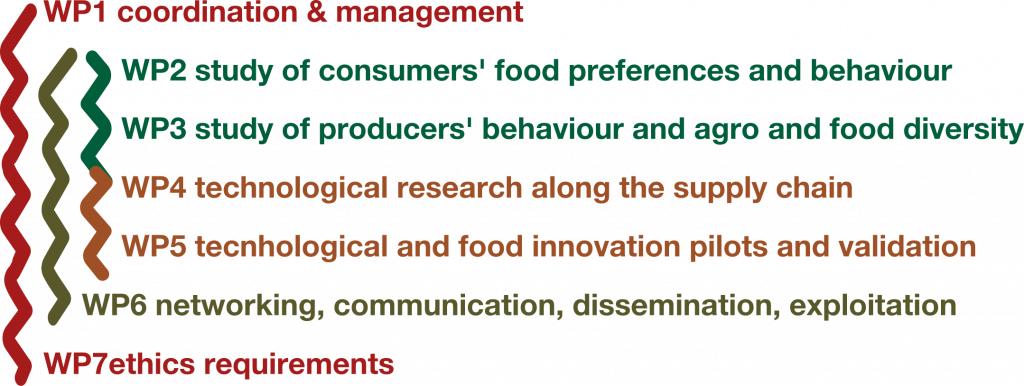Work package leader: UNIBO
Work packages

WP1: Management and coordination
The main objectives of WP1 are to ensure the coordination between FoodLAND partners and manage the project in order to reach its objectives, and to to manage all communications, reporting and financial administration between the project consortium and the European Commission
WP2: Consumers’ food preferences and behaviours
Work package leader: University of Nairobi
WP2 aims at providing background knowledge of consumers’ food preferences and behaviours and of their socioeconomic drivers, measures the level of dietary diversity and identify its major determinants for women and children, and detects the characteristics of the raw materials, ingredients, and food products shaping the diets.
Public reports
D2.4: Reports on consumers’ food behaviours and on dietary diversity and associated factors
D2.6: Report on nutritional recommendations
WP3: Producers’ behaviours, agro-biodiversity, and food diversity
Work package leader: Mekelle University
The key objective of WP3 is to create 14 local Food Hubs conceived as multi-actors centres of innovation where to develop or enhance the organizational, technological, cultural, and operational conditions enabling local food supply chains, and to strengthen their nutrition-responsive agro-biodiversity and food diversity.
Public reports
D3.4: Report on productive and behavioural profiles of smallholder farmers (and their segments) linked to socioeconomic and demographic factors
D3.6: Food Hub agreement(s) between local actors and stakeholders establishing decision-making processes and operational rules
D3.7: Report on the jointly selected technological innovations to be developed, tested, and validated
WP4: Technological research along the supply chain
Work package leader: Sokoine University of Agriculture
WP4 is in charge of formulating technological concepts, running experimental proof of concepts, and implementing and testing of the pilot innovations at lab-/small-scale. These innovations will enable producers to strengthen agrobiodiversity and food diversity so as to increase their competitiveness and their socio-economic conditions, with special reference to women empowerment, and, on the other hand, will enrich the dietary diversity and filling the nutritional gaps in the diets of urban and rural consumers.
Public reports
D4.12: Report on technological research results, effectiveness of each tested innovative system, process, and tool, and description of the FoodLAND intermediate and final products
WP5: Innovation pilots and validation
Work package leader: Makerere University
WP5 aims at implementing and validating pilot open innovations on an appropriate large-scale in the Food Hubs, and in particular, at measuring the extent to which innovations introduced into the supply chains have the potential of reaching the project’s objectives. It also aims at testing the impact of the provision of different information on innovations uptake.
Public reports
D5.15: Protocol on the characterization of the FoodLAND novel raw materials, ingredients, and foods products
D5.16: Report on the functional and nutritional properties of the validated FoodLAND novel food products
D5.17: Report on technological validation results, effectiveness of each validated innovative system, process, and tool, and description of the FoodLAND novel food products
D5.18: Protocol for product specification and quality control for PGI/PDO protection under EU framework and labels for the valorisation of food products and identity
D5.19: Report on the results of marketing tests and guidelines for designing marketing strategies and campaigns
D5.22: Report on the determinants of innovation uptake and dissemination, impact on farmers’ well-being, and recommendations for innovation dissemination
WP6: Networking, communication, dissemination, and exploitation
Work package leader: Elhuyar foundation
IPR and exploitation leadership: EURICE
The objective of WP6 is to ensure effective external, gender-sensitive communication, to facilitate and promote stakeholders engagement at various stages throughout the project, to execute impact-oriented dissemination activities, and to boost knowledge transfer of the results in order to optimize their uptake and exploitation.
Public reports
D6.2: FOODLAND Communication Plan
D6.3: First set of practice abstracts
D6.5: Second set of practice abstracts
D6.6: Report on the awareness-raising campaign on nutritional recommendations
D6.7: FOODLAND Dissemination Plan
D6.8: Plan for IPR management and Exploitation
D6.9: Plan for the sustainability of the results of FoodLAND and major exploitations routes
WP7: Ethics requirements
Work package leader: UNIBO
The objective of WP7 is to ensure compliance with the ethics requirements that can arise throughout the project.